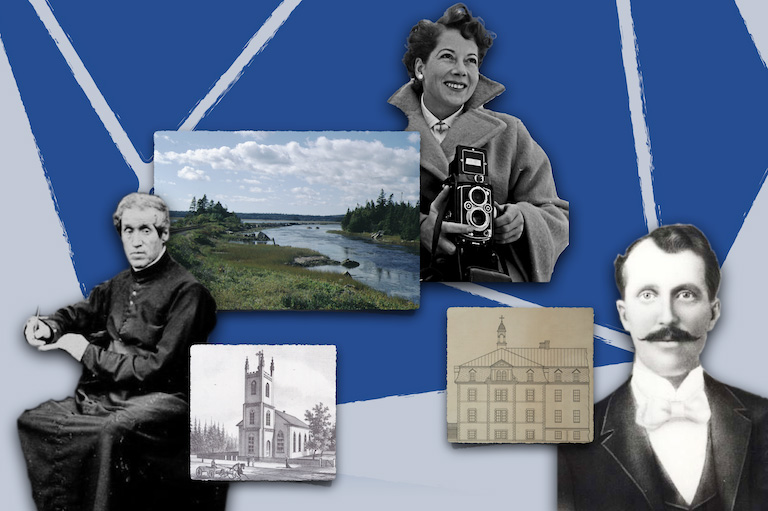Program Details
The John Bragg Award for Atlantic Canada
The John Bragg Award empowers communities to share the stories of inspiring people who have shaped Atlantic Canadian history and society. Three organizations will receive a grant of up to $50,000 to carry out an initiative or project. This award is a pilot project of the John and Judy Bragg Family Foundation and Canada’s National History Society.
Key Objectives: To contribute to the success of initiatives and projects that conserve and promote the history of individuals who have had a significant impact on communities in Atlantic Canada, and to inspire a new generation of Canadian leaders.
Successful applicants will receive a financial contribution award for projects (or activities) that do two or more of the following:
- Expand knowledge about people who have made significant contributions to Atlantic Canada throughout history.
- Increase public awareness, understanding of, and appreciation for the diverse histories of people in Atlantic Canada.
- Conserve, preserve, or protect heritage properties, cultural heritage areas, or archaeological areas or locations.
- Involve local communities in the sharing and promotion of these stories.
The Prize
Three (3) organizations will receive a grant of up to $50,000 to carry out an initiative or project.
Eligibility
- Historical societies, heritage organizations, not-for-profit organizations and community groups may apply. Communities will be defined in both geographic and cultural terms. Applicant organizations and their proposed projects must be based in Atlantic Canada.
- Proposed projects must be based around an individual who had a significant impact on Atlantic Canadian history and society.
- Eligible projects may include, but are not limited to, public programming, restoration and preservation projects, educational initiatives and digital projects.
- At the pilot project phase, all expenses directly related to the proposed project are eligible for the grant; however, this will be reviewed annually and subject to change.
- Fifteen percent (15%) of the overall project budget must be dedicated to public outreach and community development.
- Proposed projects are to take place over a 12-month period. Extensions may be granted to successful applicants upon written request.
Criteria
- Applicants must demonstrate that they have the commitment and capacity to carry out the project.
- Applicants must be able to demonstrate the historical significance of the person, or group of people, that is the focus of their project.
- Applicants must describe how their project aligns with the John Bragg Award objectives.
- Applications must clearly describe an initiative or project that will expand public knowledge and understanding of the people that shaped Atlantic Canada.
- Applicants are encouraged to seek funding from sources beyond the John Bragg Award to achieve economic, community, and national impact. Applicants must indicate the budget request for the project and include the amount of in-kind contribution and additional investment anticipated from other sources. Proposals submitted as partnerships across multiple organizations or groups must clearly articulate how they will work together and the role each partner plays in the project.
- Applicants must include a plan for the sustainability of the project and indicate how they will continue supporting this work after the grant has been allocated.
- Applicants must clearly describe the activity or program already underway, the purpose of the project andwhy they are the right group to deliver the project.
Application
Applications for the John Bragg Award will follow a two stage process. Interested organizations are invited to submit a short Letter of Intent for the grant. The Letter of Intent will consist of organizational details and a brief description of the proposed project, including key activities and outcomes.
Upon review, Canada’s History will invite a group of candidates to submit a full application. This application will include detailed short answer questions, a budget form, and two letters of reference. If you would like to see a copy of the application form in advance of submitting your Letter of Intent, please email Joanna Dawson.
Review and Selection
Stage 1: Letters of Intent
The Letters of Intent will be reviewed by the staff of Canada’s History. Applicants with successful Letters of Intent will be invited to proceed to Stage 2 and complete a full application.
Form for submitting a Letter of Intent.
Stage 2: Full Application
Full applications will be reviewed by an external committee of representatives.
Timeline
February 6, 2026 — *NEW* Extended deadline for Letter of Intent
February 27, 2026 — Applicants with successful Letters of Intent will be invited to complete a full application
April 2, 2026 — Deadline for completed applications
May 8, 2026 — Successful applicants contacted
Letter of Agreement
Successful applicants are required to sign a letter of agreement outlining the respective responsibilities of the recipient and Canada’s History Society.
Upon completion of a project, the grant recipient must submit a report to Canada’s History Society. Progress report(s) will be requested if and as needed.
Funding Acknowledgment
Financial support from the John Bragg Award must be acknowledged, typically by using the John Bragg Award logo where possible in signage, visual materials, publications, media and promotional materials, and at public events.
Successful applicants will be provided logos upon request.
Questions?
Please contact us if you have any questions.
Joanna Dawson
jdawson@canadashistory.ca
1-844-852-7377 ext 225
Themes associated with this article
Advertisement
The John Bragg Award is made possible with the generous support of the River Philip Foundation.



